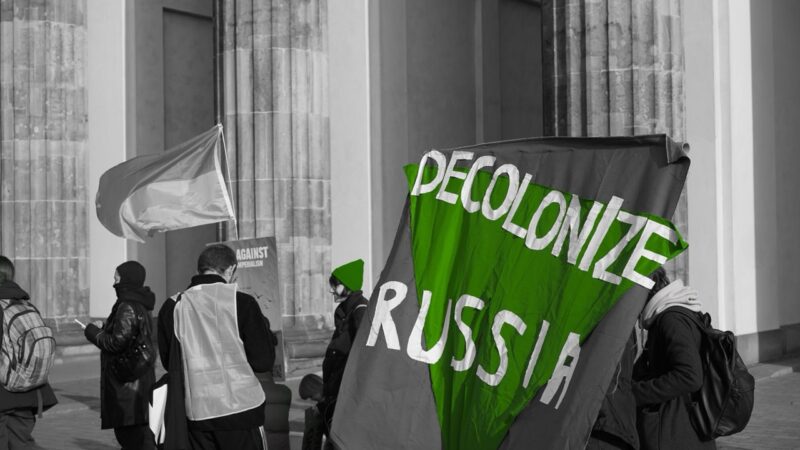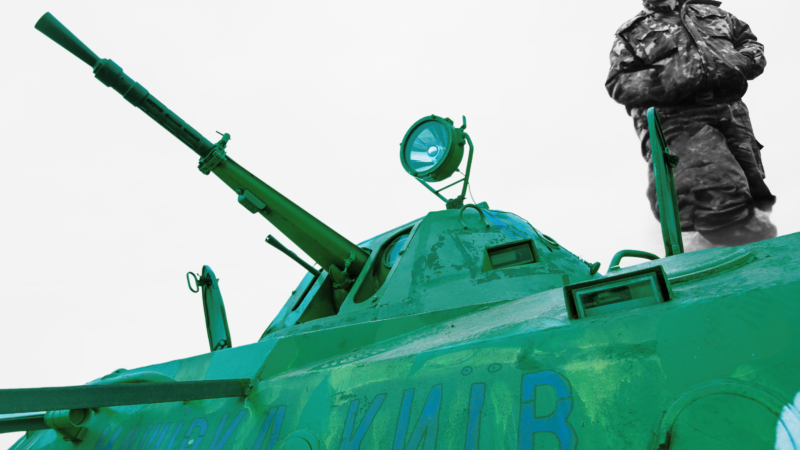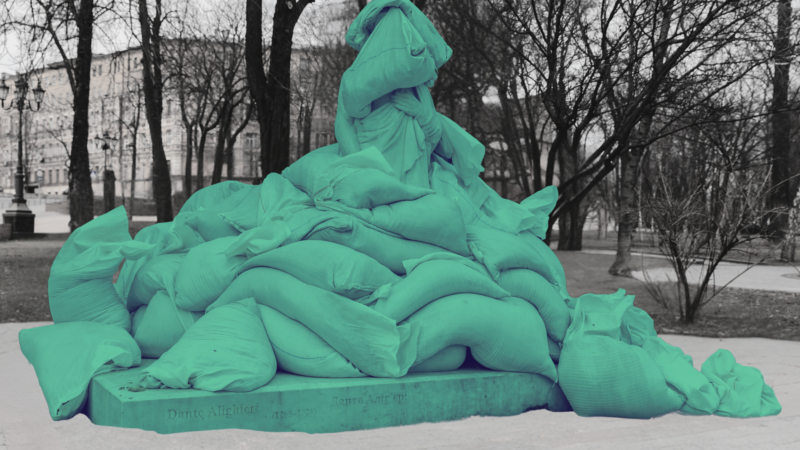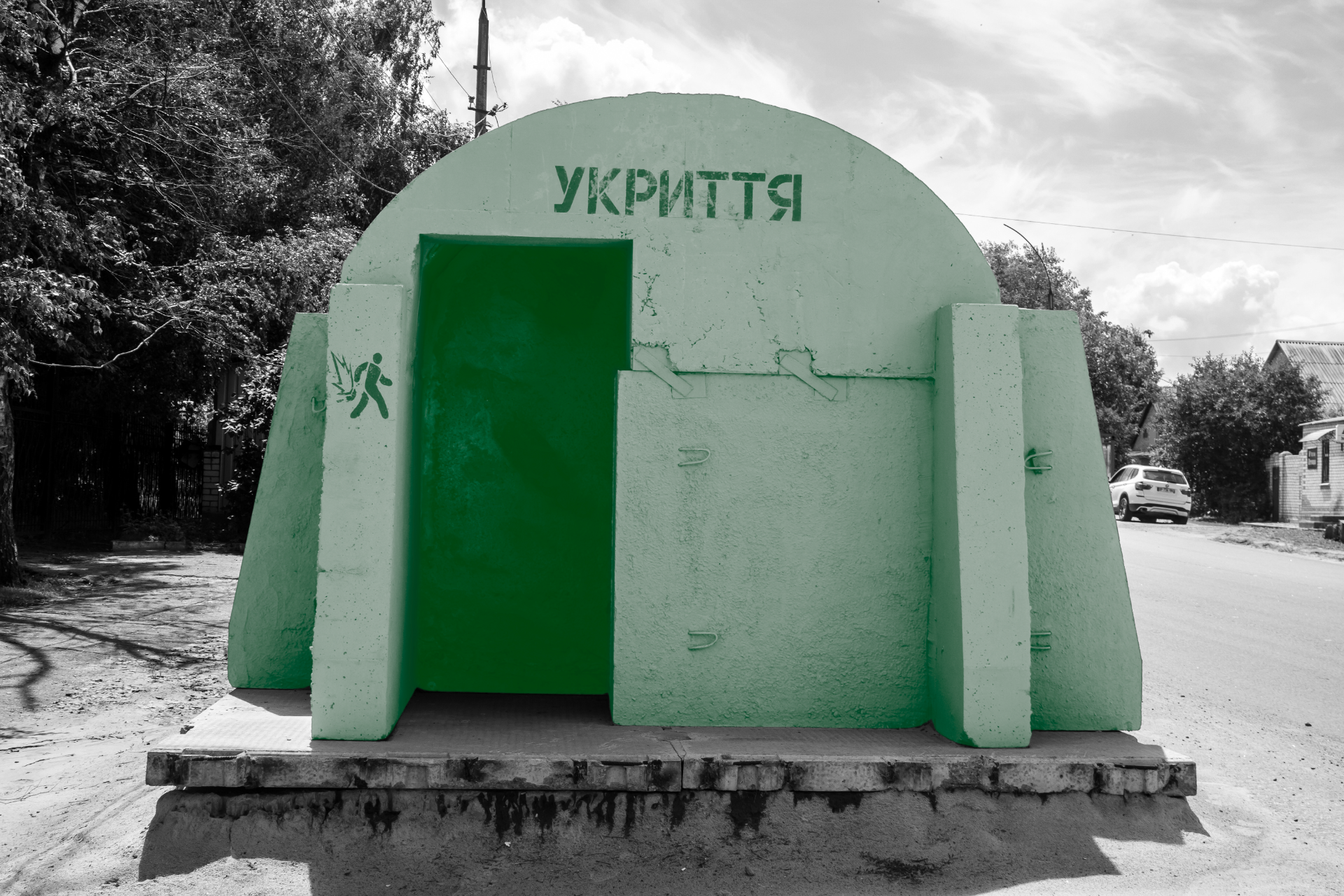The Simulacrum Empire
…An axe floats
along the river
Right towards Chuhuїv –
Well, let it swim
In evacuation.
— Anna Dolgareva (translated from Russian by the author)
A copper-haired woman recites her poetry on stage in front of hundreds of spectators. It is Moscow, a “cultural marathon” dedicated to Russia’s ongoing war against Ukraine, tellingly titled “Time for Action,” which started on 24 April 2023. The participants pretend they understand the profound hidden meaning of her words.
Essentially, this parallels the collective social pact in today’s Russia, where topics related to the “Special Military Operation” (SMO)—as Russian officials euphemistically call the invasion of Ukraine—demand a special vocabulary and attitude. The Kremlin’s propaganda continues the tradition of glorifying warfare that has flourished in Russia for the past two decades. The unassailable sacred cow is “The Great Victory in the Great Fatherland War,” as Russians call the results of World War II. According to the Kremlin’s interpretation, the USSR and particularly Russia bore the main hardships and losses of that war, and any other point of view expressed publicly may cause prosecution and penalty. What the Kremlin’s propagandists are doing right now is inserting the SMO into a bigger framework of Russian military glory with the aim of drawing a line of succession from WW II to the current invasion and describing its aggression as Russia’s ongoing fight against Nazism.
That is why the people selected to participate in the “Marathon” were so serious and thoughtful when Anna Dolgareva—the name of the Z-poetess—was reading her verses. They know quite well how dangerous it is in Russia to mess with topics that are designated by the authorities as being sacred. What can one say if one can be sentenced just for calling the SMO a war—what it really is, in fact? For the sake of self-preservation it is better to nod your head, even if the speaker is spewing pure bull.
Colonial history that remains unseen
Chuhuїv, to where the proverbial axe in the epigraph is floating, is a town in Kharkiv oblast that was partially occupied by Russia at the beginning of invasion and then liberated by Ukrainians. It’s hard to understand what the author really wanted to say, but it’s not for lack of our cognitive abilities. During the last 10–15 years Russian culture has lost touch not only with the foundations of history, truth, and dignity but also with common sense itself. The more imperious the Kremlin’s policy has become, the less adequacy has remained in Russian culture.
The modern imperial grand narrative of Russia consists of two undisputable cornerstones. The first is the invincibility of the Russian army—“the second[-strongest] army in the world,” as it presumptuously declares to the Russian philistines and journalists affiliated with the Kremlin’s agenda.
The second is the greatness of Russian culture, rooted in the “richness of Russian language” and the “genius of its people.” The imperial doctrine avoids discussing the factor of centuries-long brain drain to Moscow from its colonies and the inconvenient fact that a lot of famous Russian artists, writers, musicians and scientists have had non-Russian backgrounds. (As a matter of fact, the very name “Rossiya” was appropriated for Muscovy only in 1721 by its self-proclaimed emperor, Czar Peter I, from the older Byzantine-Slavic culture of Rus’-Ukraine.)
Until recently, the West—distracted by post-colonial redemption in Africa, Asia, and Latin America—wasn’t capable of arguing with Russia’s arrogant self-perception. Carelessly, it rejected the recognition of Ukraine as a postcolonial nation that also needs help in reclaiming its history and culture from Moscow. Among other things, Western philosophers and researchers were misguided by the fact that Ukrainians are (also) white, as normally, their colonial studies addressed people who had different colors of skin.
This unwillingness to recognize “Great Russia’s” colonial nature—with its hegemonic claim to a “Russian World” sphere of influence—allowed the Kremlin to continue its Orwellian blame-game of shifting responsibility for its own colonial encroachments onto the collective West. On 24 February Russia escalated a war that pursues an absolutely colonial aim to bring Ukraine back into its imperial fold. Meanwhile, around the Global South it spreads a simulacrum narrative, fomenting “anti-colonial rebellion” against the West, encouraging the poorest countries to join this “crusade.”
Crumbling myth
After Russia launched its full-scale invasion of Ukraine, the simulacral nature of its “great and invincible” army also became obvious.
The idea to blitzkrieg Ukraine in a couple of days failed. Of course, the assumption that a vast 40-million-strong country could be easily conquered was naїve from the very beginning. Facing losses they did not expect, Russians are not only paying for their arrogance, they are also discovering what happens when you replace facts with chimeras and rest your mindset on propaganda instead of critical thinking.
The modern myth of the “second most powerful army in the world” was cultivated since the Soviet era, when the Red Army liberated Central and Eastern Europe from the Nazis so successfully that the Kremlin decided to continue this “liberation” even after the Germans capitulated. The latter-20th-century incarnation of the Russian Empire was never so big as after World War II, encompassing the USSR “prison of nations” itself, the “near-abroad” states of the Warsaw Bloc, and ally countries of the Soviet “sphere of interests” around the globe.
Such tremendous success was achieved owing to the “brave and undefeatable Russian soldiers,” or so the Kremlin chiefs presumably believe—in any case, how the simulacrum propaganda narrative goes. In fact, the victory over Hitler’s armies on the Eastern front and the subsequent campaign in CEE was the result of extraordinary efforts and countless victims among all the nations of the Soviet Union, plus support that the USSR got from Western allies. Ukrainians were among those who paid the highest price in that war, far exceeding Russians in terms of percentage of losses in the total respective Soviet republic.
Moreover, all of Russia’s wars since the 18th century, when it became an empire, were carried out with Ukrainians participating in the imperial military forces. Reading classic Russian literature such as Tolstoy’s War and Peace and admiring the brave “Russian hussars,” a foreigner would probably not recognize that the “Russian” hussar regiments are mostly named for Ukrainian toponyms! The explanation is simple: the majority of the “famous Russian hussars” were descendants of Ukrainian Cossacks, renowned horsemen, who enlisted in pursuit of furthering their military careers. More importantly, the Kremlin aimed to vanish their historical memory of Ukraine, because the Cossacks were associated with the period when the modern Ukrainian nation really originated.
Ukrainians formed a formidable mid-rank chain in the armies of the Russian Empire and the USSR. Sergeants and junior officer corps were normally recruited from the Ukrainian population, being good soldiers both on battlefields or at headquarters. But the top command positions were usually reserved for the titular Russian nation, though numerous Ukrainians were included as well.
Some Russian bloggers who generally support the SMO and Putin’s policies have already started experiencing this revelation. They’ve suddenly realized that in the last 300 years, when “Russia” was reaching the peak of its power, Russian armies were always fortified with Ukrainians—even when they were fighting against Ukrainians.
A significant proportion of the victories that Russia has lavishly credited itself with was won by Ukrainians skills and lives.
Disputable greatness
While lamentable, there is no surprise that Russian musicians, artists, and filmmakers remained popular in independent Ukraine up to 2014. The colonial 300-year-long ties appeared to be too strong for Ukraine to get rid of them quickly after it gained independence when the USSR collapsed in 1991. Russia understood the importance of cultural expansion, and acknowledgement of Russian as the second official language in Ukraine was the subject of tireless Kremlin efforts, bolstered with powerful intrusion of Russian pop-culture promoting the idea of eternal Russian-Ukrainian brotherhood.
When in the late 2000s Ukraine decided to dub Russian films into Ukrainian, it raised a wave of mockery and outrage in Russia. Russian journalists foreshadowed the quick death of film distribution in Ukraine because no one would like to watch movies in this “provincial dialect.” Time passed, however, and the film industry in Ukraine stayed alive and kept thriving.
Regardless, up to 2014 Russian artists felt at home in Ukraine. Unfortunately, a lot of Ukrainians maintained this perception by attending their events and paying tribute to that specific sort of nostalgia when the past seemed good just because they were young. Their Soviet youth passed under the domination of the Russian language, and this unconscious colonial trauma continued influencing Ukrainians’ tastes.
Nevertheless, Ukraine gradually drifted away from Russia. Starting around 2010, the divergence between the development of Russian and Ukrainian cultures became more noticeable. Russian artists were wealthier, they could afford vivid and lavish shows. But being derivative compared to European artists and based on copying them, Russian culture no longer impressed young Ukrainians who had direct access to European music and art; they did not romanticize the USSR because they had never lived there.
While Ukrainian mass culture made its own way in the reality of the free market, Russian pop culture was declining, reduced to cooperating with the authorities and promoting official narratives. Suddenly, former rock-rebels who denied the Soviet Union when they were young began eulogizing the Kremlin’s line: unified empire, Russian glory, the Great Victory, and the supremacy of Russian Orthodoxy over the rest of Christianity—and, consequently, the supremacy of Russian values over European ones.
In Ukraine the situation was different. There were no government contracts for cultural acts, and artists tried to survive relying on their own resources. The only way to do this was to achieve commercial success, which meant creating original and interesting output. Ukraine never had imperialistic ambitions, therefore Ukrainian artists had no need to create an alternative set of values. Ukrainian culture was inherently European—not opposing it—and evolved within the European tradition.
Meanwhile, in Russia official propaganda was convincing people of the greatness of Russian culture and invincibility of the Russian army, but both entities gradually deteriorated under corruption that permeated the state.
Ultimately, practically all of Russian culture acquired the features of Shaman, one of the most popular modern patriotic singers. His “Kremlin-approved” hymns “I am a Russian” and “We” are an extremely primitive set of Russian cliches put into marching rhythms. Moreover in the “We” official video, a blond Shaman with a Hitlerjugend-style haircut strides on Moscow streets dressed in a black leather jacket with a stripe on his forearm—an image whose roots reach back to 1930s Germany. It should be strange that the country that started a huge continental war with a declaration of its motto of “fighting against Nazism” utilizes the Nazi semiotic codes so passionately. However, the explanation is obvious: Russia hastens to label everyone else as Nazis before people see that the centre of modern fascism, along with its corollary ideas of supremacy and new colonial order, is today located in Moscow. And even here the crumbling Russian regime is not original or innovative, borrowing its symbols and signs with a Nazi-inspired, non-Cyrillic letter Z, which the Kremlin chose as a symbol of its invasion.
It seems, then, that the “great culture”—a matter of pride for most Russians, propped up by Western awe and worship cultivated by extensive propaganda—has ever been naught but the selfsame simulacrum as the “mighty Russian army.” Having exhausted the reserves of colonial talent that contributed to its flourishing since the 19th century, Russia is degrading as an inevitable result of its lawless social order, lack of democracy, and strict isolationism.
The floating axe of Z-poet Anna Dolgareva is a re-utilization of a children’s limerick from the Soviet era. While a court poet should try to find some original ideas to fulfill his/her patriotic obligations to the despot-ruler, when life is permeated by the simulacrum, the only output she can come up with is pathetic, miserable, and senseless.
This article was prepared for publication with substantial assistance from Ksenia Maryniak, CIUS Editor.





